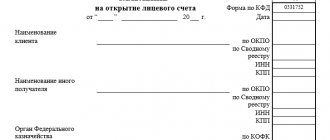Concept of splitting accounts
A personal account is an individual 8-10-digit number that the management company assigns to the owner of the living space for the purpose of calculating rent. The invoice allows you to identify the payer in the management company database; in addition, it contains the following information:
- size of occupied living space;
- number of registered;
- availability of metering devices.
The process of dividing bills in one apartment assumes that the area of such an apartment will be divided between responsible persons, each of whom will independently pay his share of utilities in proportion to the size of the living space assigned to him and the number of persons registered in it.
Splitting accounts may be required in the following cases:
- when spouses divorce but continue to live together;
- when one of the co-owners registers new tenants in the apartment;
- when neighbors in the apartment refuse to pay for consumed housing and communal services;
- in case of long-term absence of one of the homeowners;
- when registering an apartment as an inheritance by several persons.
According to Art. 31 of the Housing Code of the Russian Federation, persons registered in an apartment are required to bear joint responsibility with the owner for the maintenance of the residential premises , but in a number of cases such persons refuse to make payments, and the person in whose name the account is registered has to pay rent for all residents.
If divorced spouses or persons who inherited an apartment do not manage a common household, they also need to separate bills in order to avoid paying for housing and communal services for strangers.
What are the difficulties associated with dividing a personal account?
The Housing Code of the RSFSR, in force before the new Housing Code of the Russian Federation came into force in 2005, provided for a similar distinction. In particular, on the basis of Article 86 of this legislative act, which had already lost force, persons who were no longer relatives had the right to conclude a personal social rental agreement, according to which the subsequent division took place. In fact, this happened by dividing real estate in kind, provided that the area and technical characteristics of the premises allowed this to be done. Thus, an ordinary apartment turned into a communal one. But due to changes in the internal political course of the state aimed at eliminating such a phenomenon as communal apartments, there are no such provisions in the new Housing Code. However, the lack of regulatory standards has not reduced the urgency of the problem. However, in the current Housing Code of the Russian Federation there are no regulations that directly or indirectly prohibit the division of personal accounts for owners if such a need arises.
Partition procedure
The separation of accounts is carried out by the accounting staff of the management organization (MC or HOA), as well as resource supply companies with which the payer has signed direct contracts.
If the apartment is privatized into the ownership of one of the residents, then the division of accounts between the owner and residents occurs in the following order:
- The owner, together with the registered persons, contacts the accounting department of the management company and writes an application for the division of accounts.
- In the Criminal Code, each of the registered persons is assigned an account number and assigned a living space.
- In the next calendar month, individual account holders will receive individual receipts for payment for housing and communal services.
In the application for division of accounts, the owner of the privatized housing must indicate how many square meters are due to each of the prescribed ones, while it is important to comply with the minimum living space standards adopted in the region (12-15 sq. m per person).
The application must be accompanied by:
- copy of passport;
- an extract from the Unified State Register confirming the right to an apartment;
- cadastral and technical passport for the apartment;
- certificate of the number of registered persons.
If minors are registered in the apartment, a conclusion from the guardianship service may be required.
In an apartment for two owners, the division of accounts occurs at the request of either of them; the presence of the second is not required. It is important to take into account that each of the co-owners must be assigned a certain share of the living space, since in an apartment that is in joint undivided ownership (like spouses), it is impossible to divide personal accounts.
If the apartment is in shared ownership of several persons, then the division of accounts occurs in proportion to the shares occupied. If, at the same time, there are additionally registered persons in the apartment who do not have a share, the co-owners must determine in advance whose living space each of the registered persons will be assigned to, since their number will affect the amount of payment.
List of documents
For the most part, the decision of utility service providers will depend on how correctly you prepare the package of documents, in principle, it is small, you will need:
- a free-form application addressed to the head of the management company;
- passports and certificates of ownership of all family members;
- certificate of family composition;
- certificate from the BTI;
- extract from the house register;
- cadastral passport.
It is worth noting that you can provide the policy with copies of some documents, for example, a certificate of ownership, so that you still have the original. In some cases, a copy may not be accepted if it is not notarized. By the way, employees of management companies can independently make copies of your documents and certify them with their signature.
Whether your application for splitting a personal account for paying utility bills will be accepted or not, the question is quite complex, and everything will depend on many circumstances. First of all, if you have a debt for utilities, then you will be obliged to pay it off; until then, splitting the bill will be refused in 100% of cases. If there is no debt, then perhaps you should count on a positive decision, but again it remains solely at the discretion of the utility services.
Possible difficulties
If any of the persons registered in a privatized apartment refuses to submit an application for division of accounts together with the owner of the premises, the latter can initiate division of accounts in court.
The lack of registration at the place of residence can also become an obstacle to the separation of accounts , since the accounting department of the management company may require the personal presence of the person to whom a separate account needs to be assigned.
In this case, you need to demand through the court to obtain the right to split the account due to the long-term absence of what is prescribed, citing the requirement as a violation of the legitimate interests of the responsible payer.
The court may decide:
- divide the bills between the owner and those registered in his absence;
- declare the registered person missing.
Declaring a registered tenant missing is necessary in the case where the owner cannot deregister such a tenant without his consent - for example, if the right of residence was obtained by testamentary refusal or refusal of privatization in favor of the current owner.
In a number of cases, management company employees refuse to split accounts because the applicant has debts for housing and communal services. This requirement is illegal, since the presence of debt obligations to the management company cannot be the basis for violating the legitimate interest of the debtor - getting rid of the obligation to pay for a defaulting neighbor.
If you have debts for housing and communal services, you should demand the separation of bills through the housing inspection or the court.
How to divide a personal account in an apartment: algorithm of actions
There are two ways to divide a personal account – voluntarily or through the court. For a voluntary division, residents draw up an agreement to pay separately for utilities. If there is general agreement, there are no problems with division. This only requires that each owner certify his right to a share with a supporting document.
The agreement must be notarized and then transferred to the HOA or management company that provides utilities. An application is attached to the agreement with a request to provide each tenant with a separate personal account.
In court, this issue is resolved without the consent of one of the parties. To do this, the interested party draws up a claim in which he demands to determine the procedure for using the residential premises and paying for utilities. You can also make another requirement - about dividing your personal account. Such a claim is of a non-property nature, therefore, before filing it, a state fee of 300 rubles is paid. Attached to the statement of claim:
- a copy of the plaintiff's passport;
- copies of documents establishing the shared ownership rights of all residents;
- an extract of a personal account confirming the absence of debts for utilities (if there are outstanding payments, the court will refuse to satisfy the claim);
- a copy of the technical passport;
- receipt of payment of state duty.
The statement of claim is filed with the court at the location of the home. As a rule, the court makes a positive decision on such claims. After the document comes into force, the plaintiff transfers it to the HOA or management company, which are obliged to divide utility bills and create a separate personal account in the name of each resident.
The court or management company will refuse to share utility bills if one of the rooms in the home is deemed unfit for habitation. These are considered premises that have:
- doorway less than 70 cm wide;
- the width of the walls is less than 2 meters;
- the distance between the wall of the neighboring building and the window is less than 3 meters.
Statement of claim for division of utility bills
___________________ District Court Defendant No. 1: ______________________ Defendant No. 2: ________________________ on the division of debt for utility bills 1) Divide the debt for utility bills, maintenance of residential premises - apartment No. 86, No. 2 _____________________________.
2) Determine the division of the debt in the following proportion: - to the plaintiff ________________ recognize the amount of the debt (14 thousand 114 rubles 04 kopecks); - for the defendant _____________ to recognize the amount of debt (14 thousand 114 rubles 04 kopecks) - for the defendant _____________ to recognize the amount of debt (14 thousand 114 rubles 04 kopecks) 1. Statement of claim according to the number of persons participating in the case; 2. A document confirming payment of the state duty; 3. Copies of utility bill receipts; "___" November 2020 _______________/_______________/
Video about the registration procedure
In accordance with legislative regulation, owners of residential premises are not only endowed with rights, but also have certain responsibilities. These responsibilities also include the obligation to pay rent. In particular, housing legislation states that every owner of a residential premises is responsible for paying rent.
But residential premises may belong to several persons, i.e. it can be an object of common property
.
And current legislation states that all owners must fulfill responsibilities related to the maintenance of common property
. This fully applies to payment of utility bills.
In such a situation, many owners of residential buildings and apartments have a question about whether it is possible to divide the amount of rent between them. How to divide the rent between the owners, and is this possible?
Debt division for utility bills
Babushkinsky District Court
Moscow, consisting of presiding judge E.A. with the secretary of the court session I.P. having considered in open court civil case No. 2-..../15 on the claim of Maxim against Olga, acting in her own interests and the interests of the minor Ivan, Elena, acting in her own interests and the interests of the minor Vladislav, to determine the shares of payment for rent and utilities services and division of debt for utility bills, -










